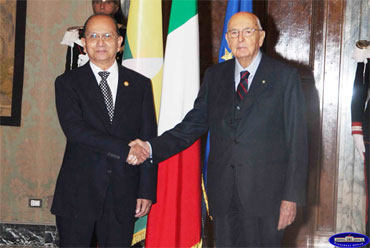Amnesty International has appealed to the UN Human Rights Council to continue closely monitoring the human rights situation in Myanmar in light of President Thein Sein's visit to Europe.
 Myanmar President Thein Sein (left) meets with Italian President Giorgeo Napolitano in Rome on March 7, the same day an Amnesty International report called on the UN to be aware of continuing rights abuses in Myanmar. (PHOTO: Myanmar President's Office)
Myanmar President Thein Sein (left) meets with Italian President Giorgeo Napolitano in Rome on March 7, the same day an Amnesty International report called on the UN to be aware of continuing rights abuses in Myanmar. (PHOTO: Myanmar President's Office)
In a statement released on March 7, the human rights NGO called for “the mandate of the United Nations Special Rapporteur on the situation of human rights in Myanmar to be renewed” and for “the Myanmar Government to guarantee sustained international human rights monitoring to promote and protect human rights alongside national human rights mechanisms.”
The release coincided with the Myanmar president's welcome in Italy where he met with his Italian counterpart Giorgeo Napolitano, who congratulated him on Myanmar’s ongoing reforms and promised to lift the remaining sanctions on the country.
Many have criticized Thein Sein's warm reception in Europe while the human rights situation in Myanmar remains so serious.
Since 2008, Myanmar has allowed the United Nations Special Rapporteur on Human Rights in Myanmar Tomás Ojea Quintana to conduct regular country visits. Following his visit last month, he said that nearly 120,000 people are now living in camps in Rakhine State with a lack of adequate healthcare, and noted that conditions were worse in camps sheltering Rohingyas and other Muslims.
Following a visit to a prison in Myitkyina, the Kachin State capital, during his five-day Myanmar visit, Quintana also said he was “concerned about the ongoing practice of arbitrary arrest and torture during interrogation by the military of Kachin men” accused of belonging to the Kachin Independence Army.
On March 1, the Network for Human Rights Documentation - Burma (ND - Burma) released a report stating that human rights abuses continued across all 14 states of Myanmar, including “killing, land confiscation, forced labor, child soldiers, forced relocation, torture and ill treatment,” with the highest incidences of abuses occurring in ethnic nationality areas, particularly conflict areas and sites of controversial development projects.
Land grabs and forced evictions increased in several areas inhabited by Karen ethnic minority people last year, according to a report released by the Karen Human Rights Group on March 5.
Speaking to Mizzima earlier this month, Bill Davis, the former Burma Project Director for Washington-based Physicians for Human Rights, said, “A vast majority of the people of Chin State—over 90 percent—have suffered human rights abuses at the hands of previous regimes of the Burmese government, and, I'm sorry to say, also at the hands of the current regime.”
Meanwhile, President Thein Sein was reported to be nominated for a Nobel Peace Prize on March 5 alongside figures such as “Egypt’s Mother Teresa” Maggie Gobran, US army whistleblower Bradley Manning, and the 15-year-old Pakistani schoolgirl named Malala who was shot in the head by the Taliban for promoting girls’ education.


